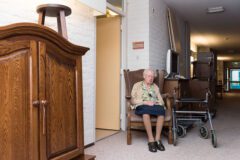Should I Be Concerned About a Nursing Home Interfering with My Loved One’s Finances and Bank Accounts?

While you may often think of theft as occurring when someone breaks into your home, car, or when someone steals something from a place of business, theft can actually be much more subtle than that. In fact, one of the most common places thievery and financial coercion occurs is in settings like a nursing home, where residents are more susceptible to manipulation and less likely to notice when their possessions go missing.
When a nursing home facility has access to your loved one’s bank account and finances, it’s natural to have concerns about the protection and well-being of their assets. Many families worry about whether or not the nursing home staff will practice the best intentions toward their loved one’s financial account. Therefore, it’s crucial to understand the rights and options you and your loved one have to ensure their finances aren’t taken advantage of.
Below, we’ll address some of these common concerns and provide you with vital information to ensure you know your full range of rights and options.
What is Financial Exploitation?
Financial exploitation occurs when someone misuses or takes advantage of another person’s funds or assets for personal gain. While it’s an unfortunate reality, nursing home residents can sometimes become victims of financial exploitation. This could involve unauthorized access to their bank accounts, misuse of funds, or coercive practices to gain control over their assets.
Financial exploitation is one of the fastest-growing forms of elder abuse. It is illegal, and sadly, it often goes underreported. There are, however, four important steps you can immediately take to help protect your loved one.
1. Understand Nursing Home Resident Rights
Federal regulations are in place to ensure nursing homes provide residents with certain rights and that facilities equip residents with certain essential necessities. Resident rights (and/or legal guardian rights) include:
- Allowing access to all records regarding oneself
- The ability of a resident or their loved ones to manage their financial affairs
- The ability of a resident or their loved ones to be made aware of available services and any charges for those services
- The ability of a resident to file a complaint without fear of retaliation
Likewise, the nursing home facility, by law, must:
- Protect personal funds residents deposit with the facility and any private funds greater than $50 into an interest-bearing account.
- Keep a detailed and independent record of the personal finances of every resident.
- Provide quarterly financial statements to residents or their legal representatives.
- Avoid charging any items paid for by Medicare or Medicaid.
2. Watch for Warning Signs
Being away from family and being isolated can significantly increase the risk of abuse going unnoticed. Staying in touch with your loved one is a critical step to ensure they aren’t being taken advantage of by caretakers. Early signs of financial abuse include:
- Any caregiver asking for, demanding, or taking money or gifts from your loved one
- A new family member suddenly asking for access to your loved one’s finances
- Your loved one receiving a discharge notice due to non-payment when they should have had appropriate funds
- Any new changes in financial practices, such as hiding money, sudden large purchases, strange donations
- Unknown credit card charges
- Statements for new credit card accounts
- Refusal by the facility to give them quarterly statements
- Refusal by caretakers to purchase items you or your loved one has specifically requested
- Not receiving Personal Needs Allowance from Medicare if a resident has one
3. Talk to Your Loved One if You Suspect Financial Abuse
If you suspect your loved one may be being exploited, then the most critical step you can take is to speak directly to them about your concerns. While this may be embarrassing or uncomfortable for some elders, always let them know that you have their best interests at heart to prevent any abuse from happening to them again.
4. Report the Abuse
Once you have confirmed that financial abuse is occurring, the next step is to report it to the facility. If the facility’s management team is responsible for the financial abuse, you may not be able to successfully report the exploitation, in which case you should contact your local long-term care ombudsman program— this an organization that advocates for residents in nursing homes and are formally trained to address complaints. You may also:
- Contact Adult Protective Services (APS), which investigates claims of abuse/neglect and elder exploitation.
- Contact law enforcement
- Visit the National Center on Elder Abuse for more information or call them directly at 1-855-500-3537.
What Other Steps Can I Take If a Nursing Home Financially Exploits My Loved One?
Along with the steps outlined above, there are a few other things you can do to protect yourself and your loved one if you suspect they have been financially exploited.
Understand Their Legal Protections
It is essential to understand that laws at both the state and federal levels safeguard nursing home residents from financial exploitation. In the US, the Nursing Home Reform Act requires nursing homes that are part of Medicare and Medicaid programs to protect residents’ financial affairs and other rights. Furthermore, many states have their own laws that provide extra protection against financial abuse in nursing homes.
Establish Power of Attorney
Establishing a power of attorney (POA) can be an effective tool to protect your loved one’s financial interests. A POA grants a designated person, known as the agent or attorney-in-fact, the authority to manage the individual’s financial affairs on their behalf. By choosing a trustworthy and responsible agent, you can help ensure your loved one’s finances are properly managed and protected.
Monitor Financial Accounts
It is vital to keep a close eye on the financial accounts of your loved ones to catch any unusual activity or signs of financial exploitation. This involves examining bank statements, transaction records, and any documents related to their assets. If you come across any questionable actions or transactions that were not authorized, it is crucial to take prompt action.
Seek Legal Advice
If you suspect a nursing home is interfering with your loved one’s finances, consulting with an attorney experienced in elder law and nursing home abuse is important. They can evaluate the situation, gather evidence, and pursue legal remedies on your loved one’s behalf. These remedies may include filing a complaint with the appropriate regulatory agencies, pursuing civil litigation, or seeking other legal remedies available under state and federal laws.
Conclusion
Remember, open communication with your loved one, regularly monitoring their financial accounts, and taking proactive steps to protect their assets can significantly reduce the risk of financial exploitation in a nursing home setting.
If you have concerns about your loved one’s financial well-being, it’s essential to consult with legal professionals who can provide guidance tailored to your specific situation.






